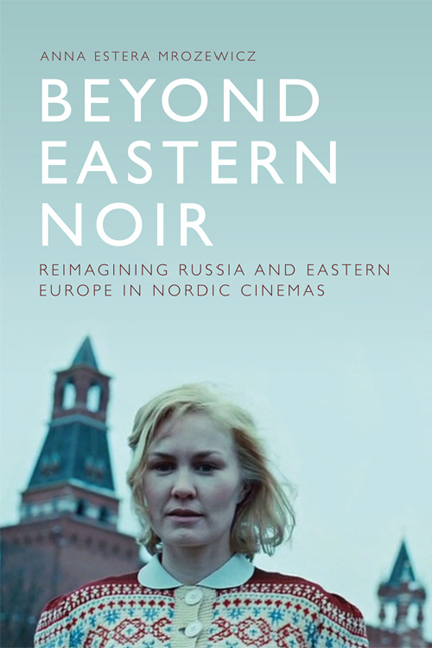Book contents
- Frontmatter
- Contents
- List of Figures
- Acknowledgements
- Introduction – The Iron Curtain Effect: Nordic Eastern Noir
- 1 Borders: Russia and Eastern Europe as a Crime Scene
- 2 Boundaries: Infiltrated Identities
- 3 The Baltic Boundary
- 4 Guilt and Shame in (Trans)national Spaces
- 5 Embodying the Fear of Russia: The Militarised Body
- 6 Polish Spectres in our House: Revisiting the Nordic Metaphor of the Home
- Afterword – Beyond Eastern Noir: Toward a New (Cinematic) Space
- Bibliography
- Filmography
- Index
6 - Polish Spectres in our House: Revisiting the Nordic Metaphor of the Home
Published online by Cambridge University Press: 24 April 2021
- Frontmatter
- Contents
- List of Figures
- Acknowledgements
- Introduction – The Iron Curtain Effect: Nordic Eastern Noir
- 1 Borders: Russia and Eastern Europe as a Crime Scene
- 2 Boundaries: Infiltrated Identities
- 3 The Baltic Boundary
- 4 Guilt and Shame in (Trans)national Spaces
- 5 Embodying the Fear of Russia: The Militarised Body
- 6 Polish Spectres in our House: Revisiting the Nordic Metaphor of the Home
- Afterword – Beyond Eastern Noir: Toward a New (Cinematic) Space
- Bibliography
- Filmography
- Index
Summary
As a number of films discussed in previous chapters demonstrate, the fear of Russia is an enduring topic in Nordic cinemas, articulated either through the modality of Eastern noir, as a subject (self-)critically and/or humorously approached, or as an emotion expressed at the subliminal level. In this final chapter, I would like to focus on another fear – that of the ‘spectre’ of workers migrating to the Nordic countries from the so-called ‘new members’ of the European Union, the largest of these being Poland. As Rosalind Galt has observed, post-Wall European cinemas redraw ‘both the discursive and the referential spaces of nations’ and are characterised by co-articulations of ‘cinematic space and geopolitical space’ (2006: 4–5). Indeed, in a number of Nordic films, Polish labour migrants not only signal the changing structures of societies and emergence of new transnational identities, but also prompt a revisiting and reconstructing of the central political metaphor defining the Nordic welfare states – that of the home. The films discussed in this chapter challenge both the political metaphor and social reality shaped by the concept of ‘home’.
Although ‘notions of family, home and local community have generally been central metaphoric resources from the very beginning of modern nationalism’ (Gullestad 2006: 94), and the ‘European house’ metaphor (first used by Mikhail Gorbachev in 1985) has figured prominently in European public discourse after 1989 (Stålhammar 1997: 101–3; Van Heuckelom 2014: 73), in the Nordic context, the notion of home carries its own relevance as the most ubiquitous and powerful concept for imagining the Nordic welfare state. Its centrality and prevalence is reflected in Scandinavian languages. Danes and Norwegians often use words denoting home, such as hjem, hjemme, herhjemme interchangeably with ‘Denmark’ and ‘Norway’ (as opposed to the world outside). The widely used Swedish term folkhemmet (‘the people's home’, ‘the folk home’) was adopted by Swedish social democrats in the 1930s ‘to suggest that familial solidarity should be extended to everybody within the modern and progressive welfare state’ (Gullestad 2006: 94). Although this term does not translate directly into the other Nordic languages, the links between the welfare state and national identity are equally as strong as those in Sweden (Hilson 2008: loc. 1790).
- Type
- Chapter
- Information
- Beyond Eastern NoirReimagining Russia and Eastern Europe in Nordic Cinemas, pp. 169 - 193Publisher: Edinburgh University PressPrint publication year: 2018



